#cw: depths
Text
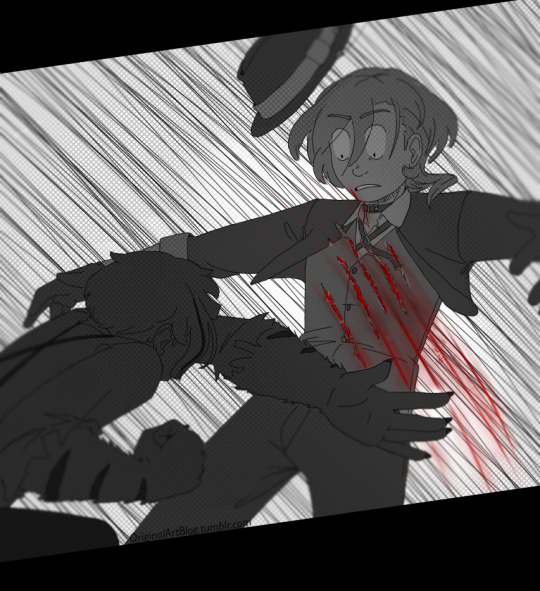
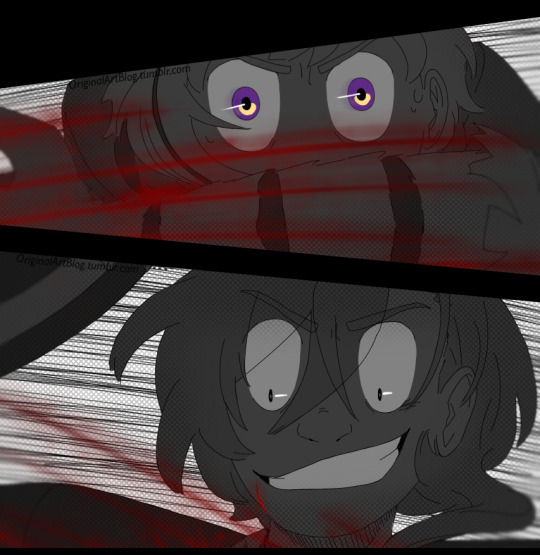
Now this is what I call a fight!
Based on @whathorselegs' wish/headcanon post, about Atsushi and Chuuya fighting and Atsushi's claws cutting through Chuuya's gravity manipulation. The visual of it gripped me by the throat.
#(chanting like a mantra)#to get better you need to step out of your comfort zone to get better you need to step out of your comfort zone to get better you need to s#not like i wanted it to be but close enough for out of my depth i felt drawing this#it came out MUCH better than i ever hoped it could so there's that!!! i actually like it#bsd#bungou stray dogs#bungo stray dogs#bsd fanart#bsd chuuya#bsd nakahara chuuya#bsd atsushi#bsd nakajima atsushi#nawy's art#blood#cw blood
801 notes
·
View notes
Text
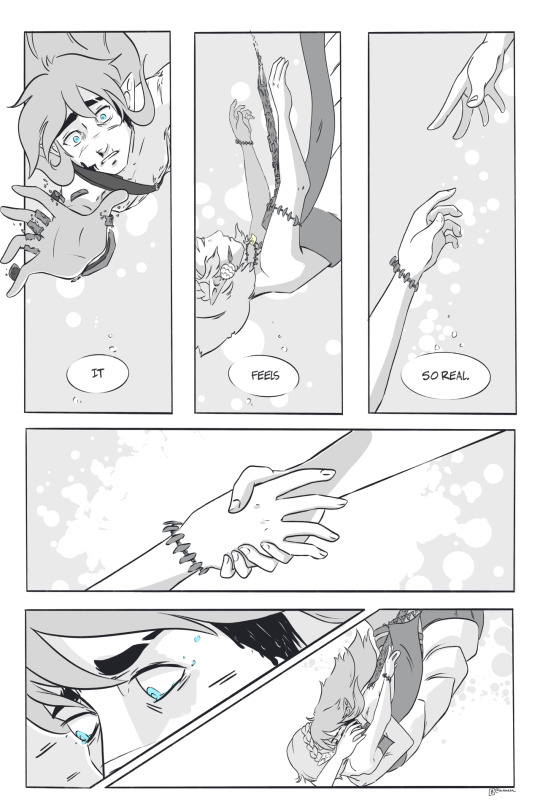
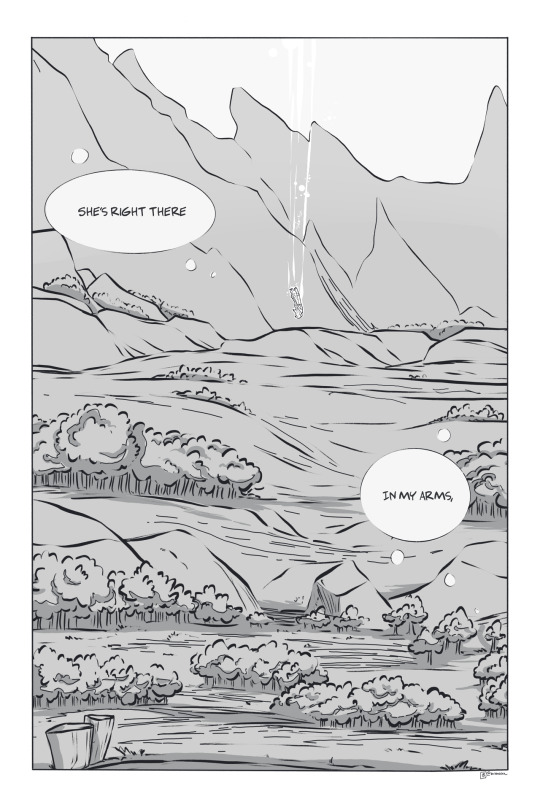
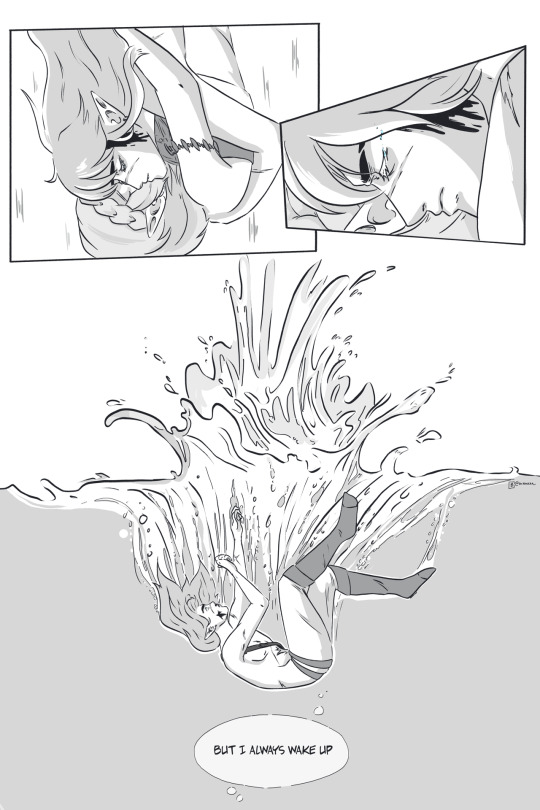

chapter 1 pages 9-12
[ title page ] [ previous ] [ next ]
#the depths au#fancomic#loz au#main comic#loz#tloz fanart#totk spoilers#totk#chapter 1#cw: blood#cw: body horror#kinda? tagging to be safe bc of his arm disintegrating
228 notes
·
View notes
Photo
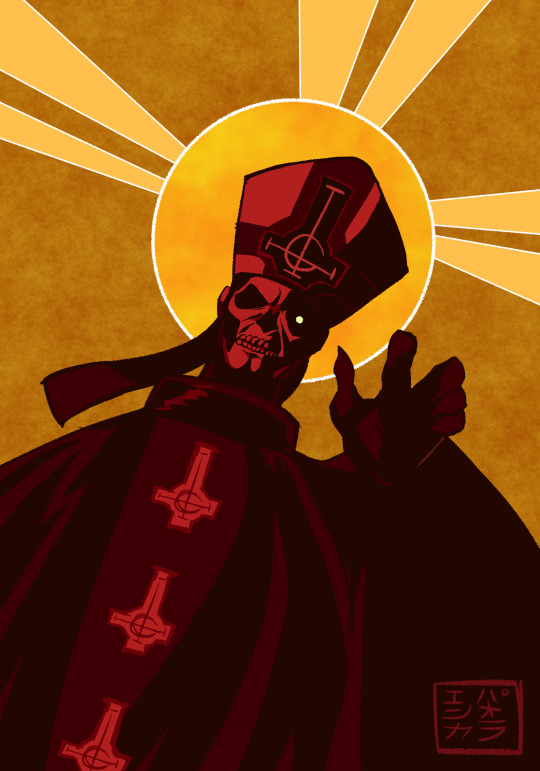

Into the source of wisdom, beyond the Bible lies
Into the endless depth of Satan's eyes.
Happy 10th Anniversay, Infestissumam!
#my art#cw eye contact#ghost#papa emeritus ii#ghost band#ghost bc#papa emeritus#ghost fanart#band fanart#heavy metal#hail satan#depth of satan's eyes#digital art#ghost band fanart#infestissumam#yeah tis hard to believe i drew this holy hell man#i might want to make this a print.#this song inspired me. colors were inspiration from infess's album cover :3#I JUST FOUND OUT OKAY#YEAH THREE GHOST POSTS IN A ROW IM JUST-
997 notes
·
View notes
Text


Old Warly & Webber doodle based on a quote I thought was cute <3
#don't worry about webber's arms being super long he's a spider it's fine#dst#ds#dont starve#dont starve together#dst webber#dst warly#warly#webber#art#sorry for not posting art in months again </3 I will try harder#i will plumb the depths of my miserable littol old doodles#cw spiders
106 notes
·
View notes
Text
Okay, so I know everyone loves the joke about pre vampire Astarion judging based on vibes, but I do feel like his more...Foppishly flippant persona is one he put on after being turned and enslaved by Cazador. You see peeks of his previous personality in dialogue, such as this one linked here

I don't think he was a corrupt magistrate in the way people tend to think. Silly, accepting bribes all the time (maybe every now and then, though, don't get me wrong) and just only getting the job due to nepotism.
We've seen Astarion already have prejudices against gnomes, Gur, and other minority groups. It's not far to say that he allowed these to sway his rulings or even have him push for a ruling, such as what he may have done with the ruling that the Gur killed him for. Hell, he might have even refused a bribe from Cazador and that's what put him on Cazador's radar to set him up to kill. (Or something. I do feel like Astarion did a thing that annoyed Cazador and he wanted to "put him in his place.")
I do have this question and this is going to bring some speculative thoughts.
Why is a guy who was probably a high moon elf so prejudice and cut throat? Moon elves aren't known for being prejudice and cruel, in fact they detest cruelty and unfairness. Sun elves were a bit more prejudice and believing in elf superiority, known to act first when dealing with drow and ask questions later, but I hesitate to consider Astarion a sun elf due to the fact we see the other spawn. Their colorations didn't change except their eyes.
The only reason I can think of is if his family wanted to leave behind the free spirited, traveling attitude of their moon elf brethren and wanted to reach for some higher status, and found a way to do that in Baldur's Gate. Astarion does mention a moon elf noble house in Evermeet, so he isn't so disassociated with his people as some might suggest.

"House Nightstar was a moon elf house led in 1367 DR by the twin sisters Halaema Nightstar and Saelihn Nightstar. (x)"
So taking in this guy's possible family ambitions to maybe be up in the high elf pecking order as some of the sun elf houses....
Astarion would have been a serious magistrate, albeit a highly biased one.
He would know the laws like the back of his hand, and yet would bend them to fit what he wanted them to be in his rulings. Yes, this is the law, but wouldn't it be better if we kept the vagrants out? Yes, I know this is the typical standard, but we should be more severe on these people so they know not to step out of line. He would do everything by the book, but some of the rulings would be viewed as severe due to who he was working with.
And would he enjoy the power and influence of the job? Yes. He would have indulged himself outside of the office. But inside the office, he'd be cut throat to gain the next level to build up the family power level.
I welcome other thoughts, because my ADHD just ran out of steam.
#Baldur's Gate 3#BG3#astarion ancunin#I miss when I could go on and on in analysis#I need to practice it more apparently#train my focus a little more then you'll all witness the utter ridiculous depths of my analysis#long post cw#cw long post
160 notes
·
View notes
Photo

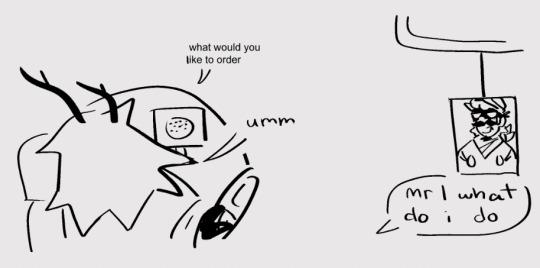
im captivated by his swagless looks and cringe fail personality
#he has so much depth to his character he is not just evil luigi#are you listening to me. guys are you l#are you listening (PUNCHING THE WINDOW) ARE YOU LISTENING#///#super paper mario#spm mr l#mr l super paper mario#mr l#mr. l#dimentio#dimentio spm#dimentio super paper mario#drugs#cw drugs#tw drugs#dimentio fanart#mr l fanart#super paper mario fanart#spm fanart#smb#smb fanart#super mario bros fanart#sona#my art#ohmaerieme
405 notes
·
View notes
Text
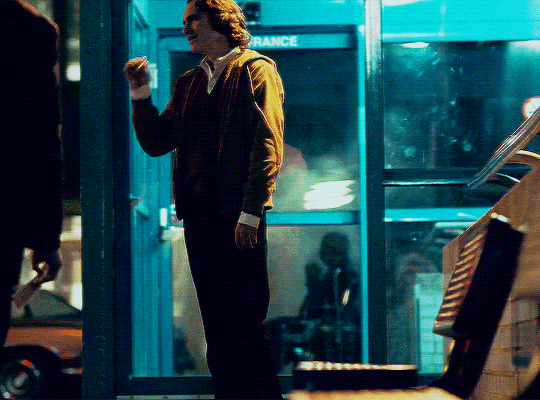

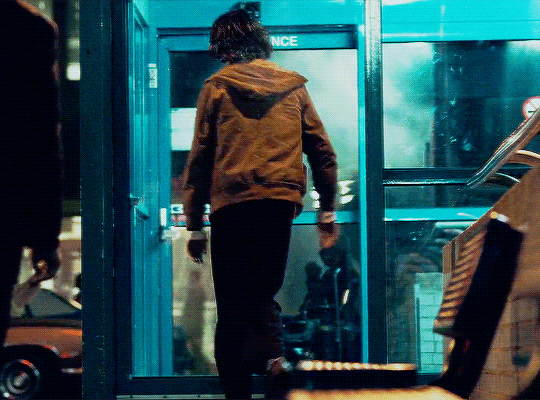
joker (2019)
#jphoenixedit#joaquinphoenixedit#joaquin phoenix#joaquinpedit#filmedit#please don't claim as your own/edit in any way. thank you.#mine#mine.#dcedit#dcmultiverse#comicsedit#moviegifs#joker#jokeredit#usermarina#smoking cw#so fun thing i do this too. between adhd and dyspraxia my balance and depth perception is really really off#the movie played it off as a fun joke and all ik but like it does happen frequently#also fun fact i have all three of the dys. dyslexia dyscalculia and dyspraxia#i got absolutely floofed in that department lmao#but yeah if a window is really really clear i cannot see it#funnily enough tho i dont do this with glass as often#as i do it with straight up regular not clear doors and walls#bc i cannot distinguish where the space is
61 notes
·
View notes
Text
DEO: Department of Extra-normal Operations
This will be an essay that looks into the ethical problems of the DEO. For the purpose of this essay, I am not concerned about the showrunners reasons for their decisions for how the show presents the DEO. I care only about examining the worldbuilding and stories inherent within the world created. So let's dig into some philosophy and theory. Whee! [Minor spoilers]
To start, this department was first created within the Superman/Supergirl universe in order to analyze alien activities after Superman reveals himself on Earth. It's made in retaliation to the appearance of powerful aliens that those in power deem possible threats. Already, the DEO's beginnings are rooted not in true protection but in stopping and eradicating what those in power deem a threat. It's roots start with dubious ethics.
Let's examine it's history:
It was led by Hank Henshaw, who is vehemently anti-alien. Henshaw is also slated to have ties to Cadmus, which experimented on aliens and attempted several rather horrific and genocidal attacks on aliens. (Note that in Supergirl: Season 2, Kara and Lena thwart Cadmus' activities. Lena Luthor saves the day by modifying an alien killing virus to be harmless to all living creatures. Bits and pieces of the worldbuilding around Cadmus showed that the aliens experimented on came from DEO facilities.)
Henshaw dies when Jeremiah Danvers "kills" him when saving J'onn J'ozz, who then takes Henshaw's place until exposed. He recruits Alex sometime before his exposure (Season 1). After J'onn is exposed in Season 1, Lucy Lane takes control. Then after J'onn helps Supergirl defeat the murderous Kryptonian Non, J'onn received a presidential pardon and was reinstated as director. He kept Henshaw's guise for publicity sake.
The show makes it clear that J'onn choses to be the Director to change the DEO. Yet, what evidence is there that this actually happens?
So that's the basic history.
We have a clandestine agency that has unethical procedures that doesn't change under a new director.
The DEO picks up aliens and throws them in a cell to never be seen or heard from again. This would likely terrorize the alien neighborhoods. This is never truly address in any meaningful manner by the Superfriends or Kara.
In fact, if anything, the show positions the DEO as being Good if Alex, J'onn, or Lucy are in charge (Kara, ironically is not in charge of the DEO at any point). However, the DEO becomes Bad if Lex Luthor or Lauren Haley or the real Hank Henshaw are in charge.
This creates a rather large ethical problem.
First of all, the worldbuilding builds up the argument that certain people are good and certain people are bad. The person we see skirting between those two extremes, and living in a morally grey area the most, is Lena Luhor. For the purposes of this essay, I'll put a pin into Lena's characterization and focus only on the DEO.
Secondly, we are told again and again what Kara/Supergirl's ethics are: justice and truth. Yet when we examine Kara's actions within the context of her DEO Supergirl duties, we are confronted with the following:
She must hide her identity, even from her best friend Lena, and thus deceives regularly. Her reasons for not telling Lena are rooted in the pressure from those at the DEO to not tell Lena but also in Kara's intense fear of loss. However, Kara will demand truth from others despite her hypocritical actions. This doesn't seem to fit solidly in the "good" category.
Her "justice" is defeating criminals. Humans go to the police to eventually have a fair trial. However, aliens are not afforded that same right. Her justice for aliens becomes judge and jury. Since she professes to "not kill," she at least doesn't extend that to executioner. This again doesn't fit solidly in the "good" category.
Thus, by examining Kara/Supergirl's actions, we see a disconnect with what the show claims is "good:" truth and justice. Yet, there is no true justice for the aliens fought and captured; their rights are rescinded (if they had any at all).
This is why the show must tell us who is "good" and who is "bad," because people's actions do not fit the show's claims of what "goodness" is versus what "badness" is. Thus the worldbuilding ends up defining Kara's actions as always "good" even if those actions cause harm to those around her.
[Side note: This isn't to say that Kara is "bad." It is to say that the binary within the show's worldbuilding lacks nuance for the complexity within Kara's understanding of the world and how she acts within that understanding. This binary simply cannot allow for such a complex examination as there is no room for it.
Because of this binary, the show actually butchers Kara's character to make her past "not good" actions as somehow "right" and "good" in the end. We see this with how Kara's harmful actions toward Lena (the lying, duplicity, deception etc) is turned into "I did just one mistake" when it wasn't one mistake. It was years of harm, but because the show paints Kara as "good," Kara is not allowed growth.
This binary of good versus bad is already nonsensical in the worldbuilding since Lena Luthor's very existence throws this entire frame out the window. Her actions, always with the intention to do the least harm and try to improve the world, don't fit neatly into the binary. The story often punishes her for this. (She breaks the binary too much I suppose.)
Yet when other people's actions fail to fit neatly into the binary, the show whispers: "Hush, don't look or think, believe us when we say this person is good and this person is bad.']
To reiterate: It's okay to capture aliens and disappear them without any right to trial If the Superfriends are doing it. This good/bad definition collapses ethics into meaningless words since the activities and procedures of both the "good" people and "bad" people don't differ in terms of impact on alien communities. This lack of differentiation is why we must be told who is good. Otherwise, how would we know?
To dig a little deeper, in Season 4, when Kara is on the most wanted list, she learns very little about the true plight of aliens. During this time, the DEO becomes "bad" under the control of Lauren Haley. Lena Luthor and Alex Danvers, who are both working with the DEO still, also work against the DEO but only to clear Kara's name. So justice is done for Kara's sake but not for the other impacted alien communities.
Once Kara's reputation is restored and she's no longer deemed an "enemy of the state," Kara returns to working with the DEO, as it is now labeled as "good" again because Alex is back in charge.
Ironically, the only person in Kara's friendgroup that questions the DEO is Lena Luthor. (Who in Season 5 will have her 'villain arc' only to be redeemed to the good side again at the end of Season 5. She's the only character, who is labeled a villain at one point, that is allowed true redemption.)
We learn very little about what alien communities actually think about the DEO and about Supergirl in particular. The most we get is the Children of Liberty plot line of Season 4; however, this plot line doesn't ever give us a solid viewpoint from impacted alien communities. Instead, we are confronted with:
We are told what alien communities are like and how lacking in rights they are. Very little of this is shown directly outside of "criminal aliens." Or the brief glimpses within Manchester's arc. However, Manchester is viewed as 'in need of redemption' despite having very real grievances with the state of things. The show then tells us that Manchester is 'bad' and the 'good' J'onn and friends must stop him.
The second time we see alien daily lives is Nia's return to her hometown, which is attacked by supercharged humans. This blended town of aliens and humans serve as an outlier. Nia actually admits that the town is unique and not representative to most aliens' experiences. So again, we don't see a direct experience of alien life in National City or other major cities.
Aliens either have significant powers that humans can justifiably find scary or they are human-like with little to no powers. Both are treated the same for the sake of the Children of Liberty plot line, which serves as an immigrant allegory. @fazedlight and @sideguitars did excellent analysis on this and the problems of these allegories based on the worldbuilding and story itself. (Note: thank you to fazedlight for finding the post in question! Click here o read their analysis.)
This makes it easier for the show to pretend that the DEO is "good" when the Superfriends are in charge. Since we don't meet alien families harmed by the DEO's actions, we never truly get an alternate perspective.
Even Lena Luthor's critique of DEO is spat upon by the story, where her alien friends fail to truly counter her valid points. Instead, it's presented in the good/bad binary, which erases all nuance and ethical considerations.
Let's also consider the start of the Supergirl career. Kara is captured by the DEO 12 years after her initial appearance on Earth. However, prior to this moment, we had learned that Kara had nearly been taken by the government -- specifically Henshaw's control of the DEO. Jeremiah Danvers agrees to work for the government in exchange for Kara's freedom from being a government asset.
However, her saving Alex's flight puts her in the crosshairs of DEO, and eventually she is captured. Upon which she learns J'onn is in charge (not the original Henshaw), and J'onn's goals are revealed. He allows Kara to fight her first alien fights as Supergirl. Here we see that J'onn's methods have not actually changed anything about the DEO.
The alien fight results in that alien being captured. Supergirl/Kara never hears what happens to the alien she fought and captured. No thought is given to the rights of that alien or if a fair trial will be given. Instead, we are told the alien is a "criminal' as if that somehow justifies the brutal treatment.
After Alex reveals she's an agent with the DEO, Kara fully trusts the agency.
So Jeremiah gave up his life to make sure Kara wasn't being used by the government, only for Kara later on working for the DEO, which is part of the government. Thus Kara ends up used by the government after all. The irony here.
Kara's blind spot here is:
she's privileged. A white-passing, human-passing alien. It's easier for her to hide as a human and not be clocked as an alien. Also, she's white, so less likely to deal with the complications of racism. The most she has to deal with is sexism and the DEO's procedures. This means she doesn't experience the worst the DEO and the systems that uphold it dish out to aliens.
Kara hasn't really interacted with aliens outside her friend group. She's relatively sheltered since coming to Earth due to Kal placing her with the Danvers and having to hide herself. She has no real knowledge of how aliens survive on Earth. This means she has nothing in which to compare the DEO's claims.
She blindly trusts Alex when it comes to DEO.
We don't see Kara questioning what happens to aliens until Season 3 (if it happens in season 1, I apologize as that season is a bit hazy for me). Here Psi saves Kara's life during a perilous mission. Kara then asks about her accommodations and finds out she has no window in her cell. She then demands Psi be given a cell with a window.
However, notice who Kara takes with her on that Season 3 mission: LiveWire (human but due to an accident became Livewire, so she's not an alien but a meta-human) and Psi (who is labeled a meta-human). So the two incarcerated people that Kara chooses are meta-humans and not actual aliens.
So again, we never see Kara interact with aliens outside her friend group unless she is interrogating them. Once the DEO is done with interrogations and the case "closed," those aliens disappear into these windowless cells. Which, need I remind that solitary confinement is labeled as torture for a reason?
Yet that is where aliens that are dubbed "too dangerous" end up by those with power. No rights given; left trapped in solitary confinement with (likely) no windows to never see the light of day again. Of course, because we are told the "good" people do this, it is thus "okay," despite it not differing in methodology with what the "bad" people did.
2. DEO's procedures don't match law. This is especially true when alien amnesty is put into law.
DEO changes NOTHING about their procedures after alien amnesty is put into law. This means that although aliens now have a legal right to a trial, the DEO does not provide this for them. No captured alien is given this right.
This means the DEO doesn't operate within the law.
So if the DEO can disregard laws if they so desire, then what is to stop them from terrorizing any citizen regardless of whether that citizen or alien or human?
What exactly is the ethics of the DEO?
Is the ethics dependent on who is in charge? But if one compares the tenure of the directors: Henshaw, J'onn, Lucy, Alex, Lauren, and Lex -- we see no difference in how the DEO acts.
They all target aliens and give them no rights. The aliens vanish into the cells never to be seen again. This includes some meta-aliens.
Some will claim that while the Superfriends are in charge only criminal aliens are thrown into solitary cells with no hope of release.
But that begs the question: Why do the Superfriends get to be judge and jury and/or executioner? What makes their decisions good but Lauren Haley's or Lex's or the original Hank Henshaw's decisions bad?
Why do the Superfriends get to decide that criminals get no right to a fair trial? Why do they not interrogate what is causing the criminal behaviors in order to change the conditions to avoid aliens resorting to "criminality" as defined by them?
In the end, it does not matter why an alien or meta-human engages in what the state has deemed "criminal" behavior; the methods used in capture and the end result is the same regardless.
The families of captured aliens see the same results regardless of whether "good" people or "bad" people are in charge of the DEO.
While alien amnesty is in law, the DEO, who is under Superfriend control at the time, does not alter their procedures to give the aliens they capture any rights. We never see the aliens or meta-humans captured ever given a fair trial. Nor do we see any programs to reform "criminals" or give them any chance at parole or redemption.
The only method for dealing with aliens and meta-humans uses a carceral prison system that is based in solitary confinement torture. Even the interrogation procedures used have elements of torture to them. In fact, many of the "interrogation" procedures use leading questions to entrap and force a confession under duress. None of these methods are conducive toward reform or fixing a system that deprives those captured of all rights.
Alternate systems for dealing with criminals are never explored. We never see transformative or restorative justice utilized. Both systems would require extensive dialogue with the communities harmed by the "criminals," and if there is one thing the DEO fail at consistently is dialogue with the impacted communities. Instead, their approach is top down, where their ideas of what is right and best is pushed down upon the communities they claim to serve.
Part of this lies with the fact the Superfriends can't engage in dialogue as long as they adhere to the oppressive methodology and practices of the DEO. Reform has failed to alter the ethical violations within the DEO. Alex Vidale wrote an excellent book called The End of Policing, which digs into the attempted reforms for police and how they have consistently failed. Vidale writes:
“At root, they [reformers] fail to appreciate that the basic nature of the law and the police, since its earliest origins, is to be a tool for managing inequality and maintaining the status quo. Police reforms that fail to directly address this reality are doomed to reproduce it.”
The DEO at its root was created to manage the inequality inherent between human rights and the lack of any rights for aliens. It was also created to control aliens and maintain a human status quo. The Superfriends attempt at reform fails to address this reality, and thus were doomed to repeat it.
Vidale continues:
“Police argue that residents in high-crime communities often demand police action. What is left out is that these communities also ask for better schools, parks, libraries, and jobs, but these services are rarely provided.”
Services to better the conditions of so-called "high-crime" communities are not shown to be rendered in the Supergirl world, while the Superfriends are in control of the DEO. It is not more policing that is needed, but more services which do not get provided for most of the show's story and worldbuilding. Thus, the communities that struggle with survival, who often must resort to "illegal" or "criminal" ways end up with only punitive measures that continue the cycle.
It's only in Season 6 when the Superfriends are no longer with the DEO that we start to see them engage in dialogue with the community in general (Kelly's arcs in particular touch on this for the lower income area that she tries to help, which is shown to be a mixture of nonwhite humans and some aliens).
If J'onn and others truly are seeking to reform the DEO, then that requires them to be in dialogue with the affected communities and to put forth new procedures that provide rights to those impacted. This is never done.
3. The DEO suffers no consequences for its actions.
The "Bad things" that happen under the "Bad" directors -- original Henshaw, Lauren Haley, Lex -- aren't ever addressed. Nothing really changes; instead the "Good" guys get back in control and things continue.
Was any reparations made for those harmed by the bad actors? Are the families impacted ever given compensation? We see some aliens rescued from Cadmus in Season 2 and Lex's Power Plant in Season 4, but what of the families of those murdered by Lex and Henshaw? The show fails to address this.
Instead, we are told that the "good" people are now in charge again and only "criminals" are being taken and incarcerated with no rights.
The concept of "criminality" depends entirely on who is in a position of power to dictate what constitutes "criminal" acts. One of the biggest problems with "criminality" as a concept is that it fails to interrogate the why these behaviors happen. What led to the "criminal act?" Are the people engaging in the act just "bad" people?
Often when basic needs are not being met, people may engage in acts of desperation to meet those needs. These actions may fall under what that society deems as "criminal." However, if the people's needs were met, then they wouldn't need to engage in desperate acts to meet their needs.
Another reason for "criminal" behavior stems from people who lack rights in a society. The oppressed will often fight against their oppressors using a mixture of methods (sometimes nonviolent, sometimes violent) in order to win their rights and transform society for the better. Until they win that fight, their actions are labeled as "criminal" by those in power.
Some rarer individuals may engage in acts of harm because they enjoy it such as Lex. However, this is actually very rare. Property crime and burglary is far, far more common. Yet, even those engaging in horrific violent crimes are still afforded a fair trial. Something aliens in the Supergirl universe are never given.
There's quite a few scenes where the aliens fought by Supergirl are engaging in robberies/burglaries or other property crimes. Those that seek to violently mass murder is actually rarer, and often the big villain of the season. At no point does anyone in the show reckon with the reasons someone may choose to engage in "criminal" behavior. Instead, all "criminals" are painted as "bad" regardless.
J'onn professes to be "reforming" the DEO to stop its reign of terror among alien communities. Yet, the most crucial components in changing an oppressive system? We don't really see him utilize them until Season 4, but by then the DEO is in the hands of Alex, who continues the procedures put into place by J'onn,
Paulo Freire writes in Pedagogy of the Oppressed concerning the "radical" as in the person seeking to end an oppressive system:
"The radical, committed to [human] liberation, does not become the prisoner of a 'circle of certainty' within which reality is also imprisoned. On the contrary, the more radical the person is, the more fully he or she enters into reality so that, knowing it better, he or she can transform it. This individual is not afraid to confront, to listen, to see the world unveiled. This person is not afraid to meet the people or to enter into a dialogue with them."
J'onn recognizes that the DEO's methods are wrong and unethical. When he takes over and poses as Henshaw, he wishes to transform the system. Except, this is where he fails, because he justifies his changes by claiming that now the DEO only locks away forever criminal aliens.
No thought is given as to why these aliens are making these decisions. What pushed them to rob a store? What pushed them to attack? Did they feel like they had no other choice? Was there no opportunities other than to rob for what they needed? Or to fight against a system that they deem is harming them and their communities?
These questions are not analyzed at all by J'onn or the Superfriends. They do not listen to those most impacted by the DEO. The only time we see J'onn seem to listen is when he is trying to work with Manchester in Season 4, but that results in Manchester being presented as bad in the end, while J'onn is shown to be good. Where he tried to redeem Manchester.
Yet Manchester had valid points about the treatment of aliens. His methodology in fighting back against what he saw as oppressive system is problematic, but he listens far more than Kara and the Superfriends to those being harmed by the systems that created the DEO.
So J'onn and the other Superfriends are failing to engage in dialogue with those harmed by the DEO. They fail to unveil what is truly horrifying with the DEO: incarcerating aliens in solitary confinement with no fair trial and no hope of ever seeing the light of day again.
The justification that because they are "criminals" this is somehow okay erases all the contributing factors that may make up the circumstances that lead to the "criminal" behavior. Nothing is truly done to remedy the situations that may drive someone to what the state labels as "criminal" behavior.
It also unveils a horrible truth. Any alien (or meta-human or even human) can be marked an "enemy of the state" and thus a "criminal," where all rights they had prior be rescinded. We see this happen to Supergirl in Season 4. The only reason she isn't locked away in a cell with no windows is because Alex and Lena don't allow it. Unlike most aliens the DEO fights to find and capture, Kara has people fighting for her.
But what about every other alien? Who is actually fighting for them?
J'onn's attempt to reform the DEO falls into the biggest trap for all radical liberators: it is all too easy to become complicit with the system at be and justify this than it is to actually change it from within.
As Paulo Freire puts so succinctly:
“Oppression is domesticating. The gravest obstacle to the achievement of liberation is that oppressive reality absorbs those within it, and thereby acts to submerge human beings' consciousness.”
Thus the DEO fails to be reformed. It's reign of terror in alien communities is not truly diminished. Nor does those fighting to "reform" the DEO engage in any dialogue with those communities to determine their needs or ways to improve conditions to decrease the need to resort to "criminal" activities.
In the end, the DEO stays an oppressive, clandestine agency that has no transparency, answers to apparently no one, takes away the rights of those they catch, and disregards laws as they please.
What the Superfriends have failed to learn and understand is that oppression cannot be defeated by reforming the system that causes the oppression. In other words, liberation cannot be achieved be reform alone.
This is why the destruction of the DEO in Season 6 is perhaps the best result at least within the rules of the Supergirl world. The Superfriends could not reform it from the inside, and by trying to do so, they ended up complicit to a harmful system. As long as they were tied to the DEO, the Superfriends would never be able to live out justice and uplift the rights of aliens and humans alike.
ADDENDUM: However, the Superfriends decision to go full vigilante is a whole other can of worms. They do attempt to be transparent in their actions for the communities they serve, but is there a way for people to hold them accountable? That isn't fully addressed. However, that would require a full essay, and this essay is only about the DEO.
#I know it's CW who failed to ever think about these topics#I wanted to get philosophical about this#if I had more energy I'd give the good/bad problem further depth as it deserves more examination than I gave#The simplification of ethics to good/bad based on who the show labels as 'good' and 'bad' is a bastardization of ethics#I love me some paulo freire#trying to reform a corrupt system from within runs the danger of becoming part of that system#Liberation cannot be achieved by reform alone#I wrote this mostly as an exercise in examining worldbuilding within a liberatory framework#I'm solidly in the DEO cannot be redeemed or reformed camp and needs to be completely taken down#A new method for dealing with dangerous aliens that respect their rights is needed#Restorative or transformative justice is my jam
27 notes
·
View notes
Text
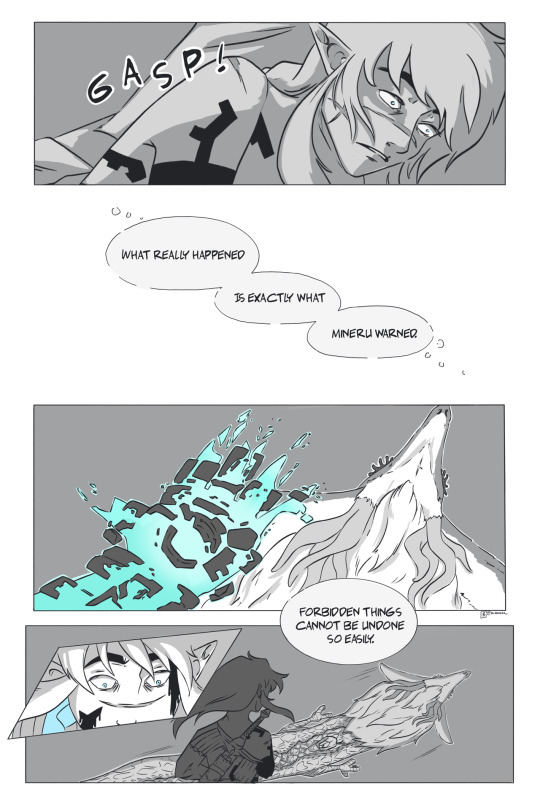
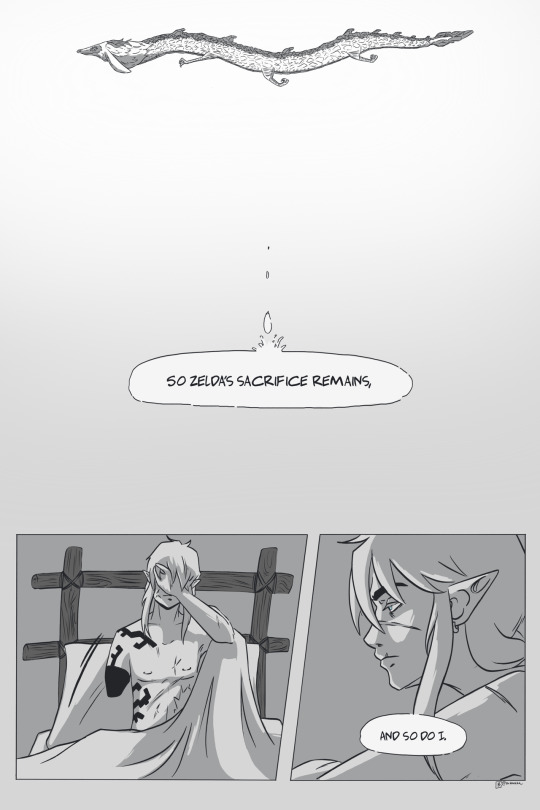
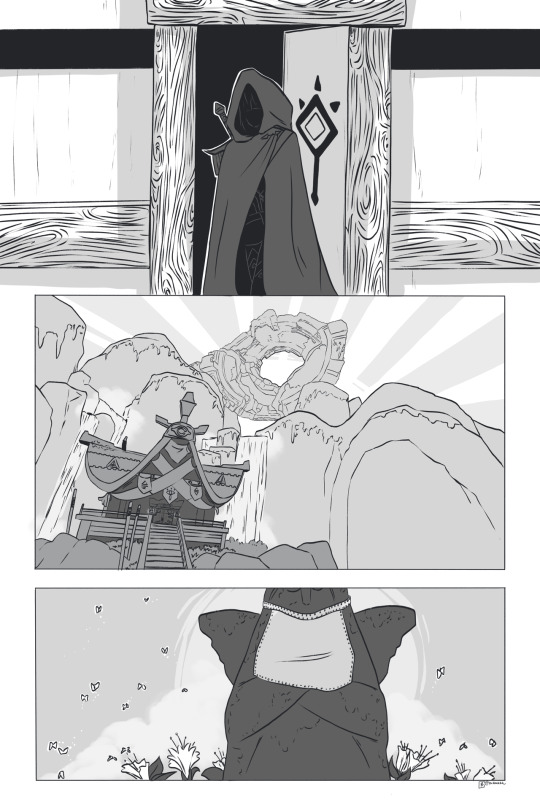

chapter 1 pages 13-16
[ title page ] [ previous ] [UPDATE ]
#the depths au#fancomic#loz au#main comic#loz#tloz fanart#chapter 1#totk spoilers#totk#loz totk#cw: body horror#cw: blood
255 notes
·
View notes
Text
[mild gore warning]
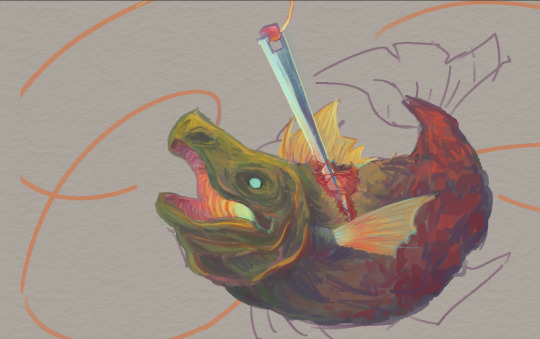
[WIP]. my hands r tired. hopefully tomorrow ill want to finish it (im so bad at finishing something if its not that same day).
#art#wip#uhhhh#gore#cw gore#cw animal death#?#yeah thats close enough.#yeah uh. i got annoyed from my parents earlier n couldnt relax so. i mad angst art of a fish#it did help calm me down..#this is my first time drawing gore and shit. im still trying to get that depth to the wound ykno#this is all being made in one layer so ill have to add blood on top after im happy with other parts of it#pleassssssseeeeeeeeee god let me be able to finish this tomorrooowww
35 notes
·
View notes
Text

i wish we’d gotten actual flashbacks of this relationship from Y5 because you know it was sooooooo Fucked, like joker and harley quinn-type toxic…
just going off how Mirei described her past to Haruka and what one can assume about Majima’s mental state at the time… vivid image of two abused people disastrously desperate for any kind of human affection, one of them being an acutely insecure teenaged idol and the other one an adult man who spent most of his 20’s in the torment nexus. Woof. the fact the game doesn’t talk about it after the car scene is imo a huge waste of juicy character stuff
#y5#mirei park#goro majima#cw unhealthy relationship#it’s SUCH a terrible dynamic and that’s why I wanna peek so bad.. these games love to set up that kind of fucked up tragedy#these games love to fail to fully realize the thematic depth and pathos of the situation they’ve set up and thus waste it.. y5 IN CHIEF#y6 weirdly one of the only ones to do catharsis successfully and boy can I elaborate on that because I KNOW that game has haters#the fact that there’s no scene in Y5’s finale where Haruka meets up w/ Majima as instructed and shows him the pen..#it’s the dramatic equivalent of being blue balled
162 notes
·
View notes
Text
brief discussion of another reason demersa is Like That


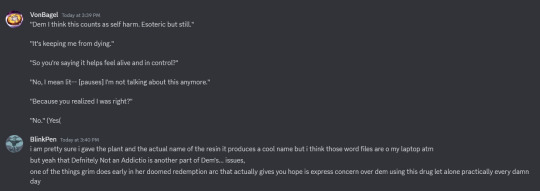
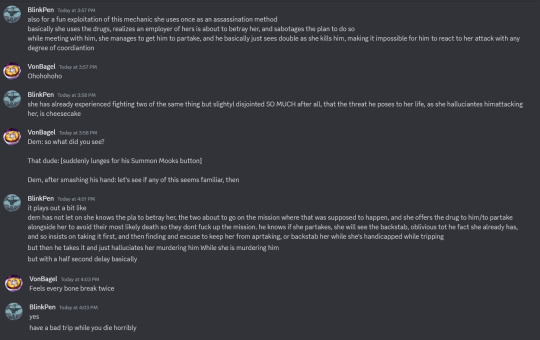

#oc babble#demersa#[contain the most recently posted drawing of dem looking all Scary at the end as a heads up]#self harm cw#addiction cw#all has only been the mantledwellers abridged versions of everything#you're not ready for The Depths#breaching into psychedelic horror now
41 notes
·
View notes
Text
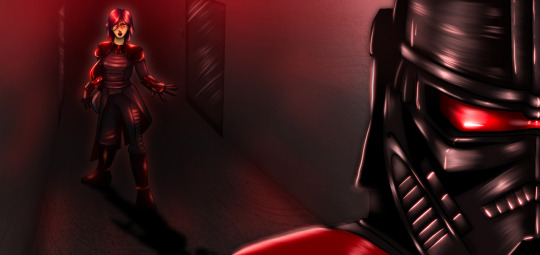
So I got my first pinch hit and wow was it a good time! Working with @elthadriel on his fic The Scent of Embers Lingers in the Air, with Purge Trooper Cody and the Eighth Sister. It’s just delicious. You can find it here
There are other artists too!
@sankt-jesper is Here and Here
It’ll get unlocked when the respective chapter gets posted!
We did all this for the @clonebang 2023 event, which I highly suggest you check out
(Spoilers in the tags, so dont read them until after the fic!)
#olives and lilies#my art#star wars#commander cody#purge commander cody#purge trooper cody#eighth sister#inquisitor#eighth sister barriss#barriss offee#sith barriss offee#inquisitor barriss offee#inquisitor barriss#Sith AU#purge trooper AU#clone wars#sw clone wars#sw cw#the intense depth of character#you dont understand how deeply I enjoyed this one#getting to live in Cody’s head and watch all this unfold#its a treat#Also. how cody got his name? phenomenal. amazing twist. very different characterization from the norm and I am eating it up
24 notes
·
View notes